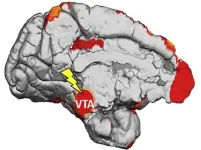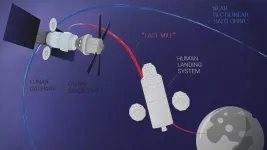(Press-News.org) Researchers uncovered for the first time what happens in animals' brains when they learn from subconscious, visual stimuli. In time, this knowledge can lead to new treatments for a number of conditions. The study, a collaboration between KU Leuven, Massachusetts General Hospital, and Harvard was published in Neuron.
An experienced birdwatcher recognises many more details in a bird's plumage than the ordinary person. Thanks to extensive training, he or she can identify specific features in the plumage. This learning process is not only dependent on conscious processes. Previous research has shown that when people are rewarded during the presentation of visual stimuli that are not consciously perceivable, they can still perceive these stimuli afterwards.
Although this is a known phenomenon, researchers were unsure as to how exactly this unconscious perceptual learning comes about. To find out, Professor Wim Vanduffel and colleagues studied the brains of two rhesus monkeys before and after they were exposed to subconscious visual stimuli.
Dopamine
The researchers activated part of the reward system at the base of the brain stem, the ventral tegmental area. This includes cells that produce dopamine, a molecule that is also released when you receive a reward. "Dopamine is a crucial messenger molecule of our motor and reward systems, and is extremely important for learning and enjoyment," says Vanduffel. Activating the ventral tegmental area released dopamine, among other things. "By stimulating the brain area directly, we can causally link the activity in that area to perception or complex cognitive behaviour," explains Vanduffel.
While the brain area was activated, the monkeys were shown virtually invisible images of human faces and bodies. Because the images were very blurry and the monkeys had to perform a very different and difficult task at the same time, they could not consciously perceive these images. The same process was followed during the control tests, but the brain was not stimulated.
When the monkeys received subconscious visual stimuli while the ventral tegmental area was stimulated, they knew details about those images afterwards. For example, they knew whether the bodies shown were turned to the left or to the right. This was not the case when there had been no brain stimulation.
"Thanks to this experiment, we can demonstrate for the first time a direct causal relationship between this brain region and, as a result, also the likely link between dopamine and the subconscious learning of complex visual stimuli."
The parts in the darker colour regulate, among others, the production of dopamine. Disturbances in this region can lead to Parkinson's disease and other conditions. | © Shutterstock
The researchers also made a brain scan of the animals before and after the test. "We can see the blood flow in the brain, which gives an indication of which neurons are active. The more blood flow, the more activity," explains Vanduffel. The scans showed that the task caused activity in the visual cortex of the brain and in areas important for memory. "With this data, we can zoom in to find out what is happening exactly at a neuronal level in these brain areas, in future experiments."
"Since Freud's insights in the 20th century, the scientific community has been wondering how subconscious sensations can affect us. Thanks to the present awareness that there is a strong resemblance between humans and monkeys, and new and advanced technologies, we can finally map such processes physiologically."
Parkinson's disease
Disturbances in the dopaminergic system can lead to numerous psychiatric and motor disorders, such as depression, addiction and Parkinson's disease. A better understanding of how this system works, in various forms of learning, is therefore crucial to developing targeted therapies for these conditions.
"Parkinson's is a motor disorder and is caused by dopamine-producing neurons dying off. However, current dopamine treatments may produce side effects because they also trigger the entire reward system, which not only reduces motor symptoms but can also lead to addictive behaviour." Fundamental research into the functioning of these brain areas will eventually lead to more targeted treatments with fewer side effects.
Plasticity
This insight is also useful in situations such as trauma, ageing or oncological problems where an increase in brain plasticity, i.e. the ability to change, could be very useful. "By stimulating areas of the brain that produce dopamine, we could, for example, enable people to regain their speech more quickly or improve their motor skills after an accident or illness. This could even be done through medication, although we are still a long way from that," explains Vanduffel.
Insights about our brain and the conditions under which we and other primates visually shape our world are therefore crucial, because, as Vanduffel concludes: "you have to know how a car's engine works before you can fix a problem with it."
INFORMATION:
Researchers from Skoltech and the Massachusetts Institute of Technology have analyzed several dozen options to pick the best one in terms of performance and costs for the 'last mile' of a future mission to the Moon - actually delivering astronauts to the lunar surface and back up to the safety of the orbiting lunar station. The paper was published in the journal Acta Astronautica.
Ever since December 1972, when the crew of Apollo 17 left the lunar surface, humans have been eager to return to the Moon. In 2017, the US government launched the Artemis program, which intends ...
An RCSI study conducted in Beaumont Hospital in Dublin has found that surgery, rather than antibiotics-only, should remain as the mainstay of treatment for acute uncomplicated appendicitis.
Published in the Annals of Surgery and led by researchers from the RCSI University of Medicine and Health Sciences, the study entitled the COMMA trial (Conservative versus Open Management of Acute uncomplicated Appendicitis) examined the efficacy and quality of life associated with antibiotic-only treatment of acute uncomplicated appendicitis versus surgical intervention. The results revealed that antibiotic-only treatment resulted in high recurrence rates and an inferior quality ...
Drugs such as beta-adrenergic antagonists (beta blockers) have been linked to a range of adverse effects, including depression. But how reliable are these data, and which psychiatric side effects might indeed be caused by these drugs? These questions have been addressed by a team of researchers from Charité - Universitätsmedizin Berlin, whose comprehensive meta-analysis has been published in Hypertension*. While treatment with beta blockers was not found to be associated with an increased incidence of depression, some studies recorded higher levels of sleep disturbance.
Beta-adrenergic ...
During the past decade the European People's Party in the European Parliament was criticized for its unwillingness to vote for measures that would sanction the Hungarian Fidesz government, which is accused of breaching key democratic principles.
Researchers have said the EPP protected Fidesz in order to safeguard Hungarian votes in its ranks and protect their own interests, but this support had weakened by 2019, when Fidesz was suspended from the EPP.
Researchers analysed the votes of EPP MEPs for 24 resolutions covering the protection of EU fundamental values ...
(Boston)-- Warning signs for Alzheimer's disease (AD) can begin in the brain years before the first symptoms appear. Spotting these clues may allow for lifestyle changes that could possibly delay the disease's destruction of the brain.
"Improving the diagnostic accuracy of Alzheimer's disease is an important clinical goal. If we are able to increase the diagnostic accuracy of the models in ways that can leverage existing data such as MRI scans, then that can be hugely beneficial," explained corresponding author Vijaya B. Kolachalama, PhD, assistant professor of medicine at Boston University School ...
COLUMBUS, Ohio - An analysis of historic and projected simulations from 19 global climate models shows that, because of climate change, the temperature in the Antarctic peninsula will increase by 0.5 to 1.5 degrees Celsius by 2044.
The projections also showed that precipitation - a threat to ice if it manifests as rain - will likely increase on the peninsula by about 5% to 10% over that same time period.
The estimates were published recently in the journal Climate Dynamics.
"We are concerned about these findings. We've been seeing overall quite big changes on the peninsula, generally getting warmer and ice shelves and glaciers discharging into the ocean," said David Bromwich, a leading author of the study and a research professor at The Ohio State University ...
PROVIDENCE, R.I. [Brown University] -- Proposals to create a national gun registry have long been met with fierce opposition from gun rights advocates. While proponents say a registry would help in tracking guns used in crimes, opponents worry that it would compromise privacy and could be used by the federal government to confiscate firearms. Now, a team of Brown University computer scientists has devised a way of implementing a registry that may allay some of those concerns.
They propose a database that uses advanced encryption to protect privacy. The encryption scheme allows the database to be searched without being decrypted, which means people querying the database see only the records they're looking for and nothing else. Meanwhile, the system places control of data ...
Lemurs can use their sense of smell to locate fruit hidden more than 50 feet away in the forest--but only when the wind blows the fruit's aroma toward them, according to a study published in the American Journal of Physical Anthropology.
"This is the first time research has demonstrated that primates can track a distant smell carried by the wind," said anthropologist Elena Cunningham, a clinical associate professor of molecular pathobiology at NYU College of Dentistry and the study's lead author.
Many animals use their sense of smell to locate food. However, less is known about whether primates can smell food that is far away, or if they instead rely on visual cues or memory to find their next meal.
Because many primates--including ring-tailed lemurs, ...
CORVALLIS, Ore. - Oregon State University researchers analyzed more than 17,000 public comments focused on orca conservation in the state of Washington and found that the most common emotional sentiments were trust, anticipation and fear.
The recently published findings have important implications because they provide conservation managers a way to convert a large volume of information to a manageable amount that can help them understand why people might support or reject management actions, the researchers said.
"Emotions are intertwined in our decision-making, often playing a substantive role in public evaluations of conservation policies," said Kelly Biedenweg, an author ...
(Portland - March 15) Results of a clinical study conducted by researchers in Manaus, Brazil, show that the Gazelle® Malaria test outperformed Rapid Diagnostic Tests (RDTs) and was nearly as accurate as more expensive and time-consuming expert microscopy in detecting Plasmodium vivax (P. vivax) malaria. The data was published Friday, March 12 in the Malaria Journal.
The double-blind study was based on 300 participants who sought care from Fundac?a?o de Medicina Tropical Doutor Heitor Vieira Dourado (FMT-HVD), located in Manaus, an area in the Western Brazilian Amazon, heavily endemic for P. vivax.
"Because P. vivax is not adequately detected by current tests, the infection is frequently missed, and patients don't receive essential treatment," said ...





